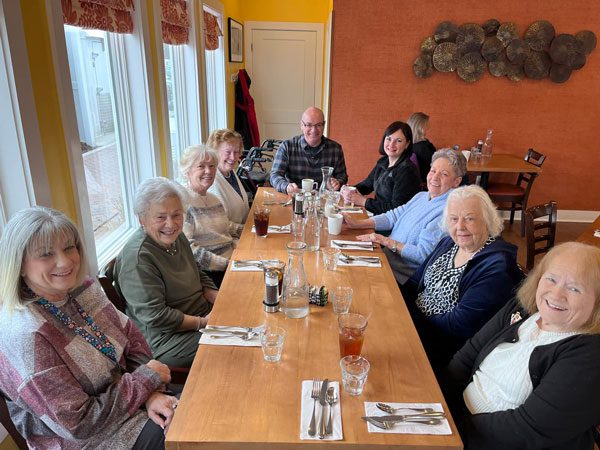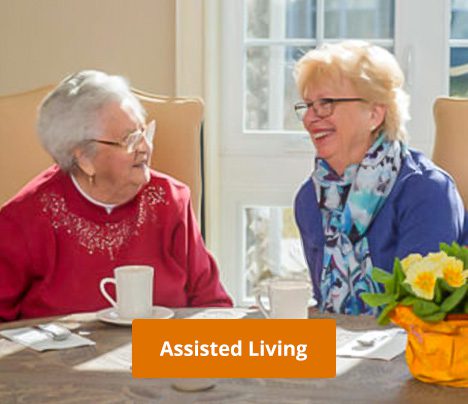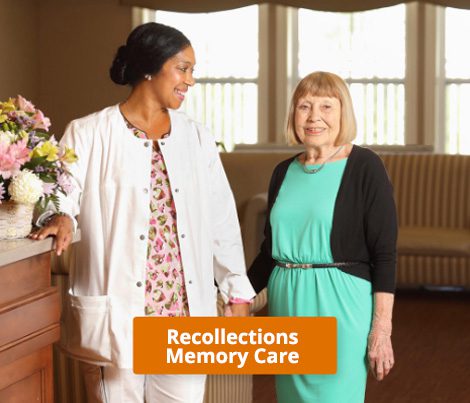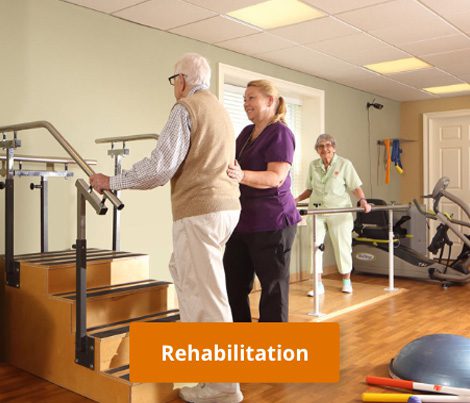Connect and Protect: A Guide to Senior Health and Socialization

Learn about the benefits of regular socialization. Plus, understand the warning signs that your loved one may be feeling lonely.
 What keeps people happy and healthy at every age? In studies and surveys, people consistently rank socializing as one of the activities that brings the most happiness.
What keeps people happy and healthy at every age? In studies and surveys, people consistently rank socializing as one of the activities that brings the most happiness.
And, it turns out, our social connections are more than just enjoyable. Relationships and social connections support overall health and wellbeing, too.
For seniors, the health benefits of social connections are especially important. While it’s normal to feel lonely sometimes, like after a physical or emotional loss, exceptionally long periods of loneliness or isolation can impact seniors’ physical and mental health.
Fortunately, there are many ways to help. There may not be a surefire vaccine against loneliness, but regular, safe socialization can act as a preventive measure. Regular socialization helps improve overall quality of life, and is linked to reductions in stress-related physical ailments, reduced or delayed cognitive decline, and overall improved mental health.
Learn more about the benefits of regular socialization for seniors (and the obstacles), the warning signs that a senior loved one may be having trouble, and what you can do to help.
Connect and Protect: Benefits of Socialization for Seniors
Wanting to connect is natural, and our connections with others bring us health benefits, too. Studies show that regular socialization benefits seniors mentally, physically, and emotionally. Whether participating in a group activity or chatting over tea with a peer, seniors who connect with others report better overall wellbeing than those who are more isolated. These are just some of the benefits of regular socialization:
- Less stress. Seniors who socialize regularly report feeling less stressed. Stress affects cardiovascular and immune health, and can lead to stress related disorders, such as headaches, high blood pressure, and high cholesterol.
- Better cognitive health. Social seniors regularly show better cognitive performance, and later or reduced onset of dementia symptoms.
- Greater emotional health and wellbeing. Avoiding isolation by socializing regularly is connected to lower rates of depression and anxiety, and better overall mood and sense of wellbeing.
- More physically active. Social seniors are more likely to exercise – and enjoy it! – with the support of a group.
Signs That A Senior Is Feeling Lonely Or Isolated
How can you tell if your senior loved one is feeling lonely or isolated? They may tell you directly. Or, changes in their behavior may signal that your loved one could benefit from more social interaction with peers. Signs of loneliness might include:
- Lack of grooming. Sometimes a lack of grooming is due to physical or cognitive difficulty, but it also can signal that a senior is feeling down.
- Increase in unhealthy habits. Unhealthy habits, like eating too much junk food or spending money frivolously, take hold because they make someone feel better temporarily. While an occasional indulgence is not cause for alarm, be aware of significant increases in unhealthy habits in your loved one.
- Change in dietary habits. Eating too much or too little can be a sign of loneliness. Some seniors may resist eating because they are uncomfortable eating alone. Others may overeat as a comfort because they are lonely.
- Change in call frequency. If you are hearing from your loved one a lot more or less lately (or their calls are much longer or shorter), that can be a sign that they are feeling lonely. Some seniors will naturally reach out when they are lonely, while others may withdraw.
Be sure to contact your loved one’s physician any time you notice a sudden or significant change in health or behavior. A medical professional can address all possible causes.
What Helps Seniors Socialize?
The “normal” process of aging can create barriers to socialization. Seniors may have difficulty socializing due to reduced mobility, loss of spouse or friends, fears about safety, and self-consciousness about physical or cognitive changes.
Fortunately, there are ways to help seniors socialize safely. Here is what helps:
- Settings that support socialization. An assisted living community provides regular, easy access to a variety of social activities.
- Access to peers. Whether in person or virtual, they will feel more connected and understood with others who share common interests and experiences.
- Access to family. Regular time to connect with family helps seniors feel included and valued.
- Structure and planning. Knowing that there is always an enjoyable activity ahead goes a long way toward feeling hopeful and positive.
- Respect for individual preferences. Everyone has different preferences for socialization: more or less often, in groups, or one-on-one. A variety of options for fulfilling and meaningful socialization helps everyone benefit.
Socialization is key to senior health. For more information about the social side of Sunnyside Manor, see our calendars here, and get a peek at our programs in action in our photo gallery and on our facebook page.
Learn More About Why Families Rely On Sunnyside Manor
Sunnyside Manor offers assisted living, memory support, and skilled nursing and rehabilitation. Learn more about Sunnyside Manor’s resources for caregivers. Whether you’re looking for short-term support or a longer-term plan, we are here to help. Begin with our “Getting Started” guide. Please call us at 888-696-2052 to speak with a senior living expert.
Sunnyside Manor, located in Wall NJ, is the area’s premier senior living community, featuring three distinctive neighborhoods: Independence ‘Plus’ Assisted Living, Recollections Memory Care and Skilled Nursing and Rehabilitation.








